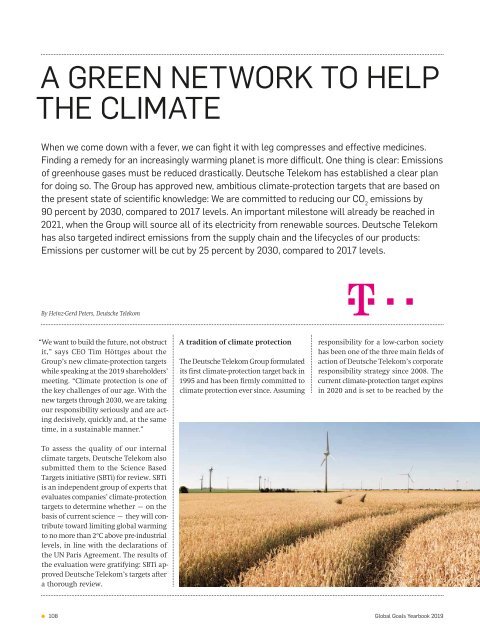Aliging Profit with Purpose - Global Goals Yearbook 2019
What are companies for? The rules for companies have changed. The focus is increasingly on their sustainable, social, and ecological impacts. The strategic orientation toward the so-called corporate purpose is decisive for profitable growth in the future. This currently results in a large number of questions for businesses: How do you find an inspiring and future-oriented corporate purpose, and how can it be aligned in such a way that it brings profitable growth and social responsibility in concert? The new 2019 edition of the Global Goals Yearbook offers answers to these crucial questions thanks to its consistent orientation toward the UN Sustainable Development Goals and a competent editorial board and author pool.
What are companies for? The rules for companies have changed. The focus is increasingly on their sustainable, social, and ecological impacts. The strategic orientation toward the so-called corporate purpose is decisive for profitable growth in the future.
This currently results in a large number of questions for businesses: How do you find an inspiring and future-oriented corporate purpose, and how can it be aligned in such a way that it brings profitable growth and social responsibility in concert? The new 2019 edition of the Global Goals Yearbook offers answers to these crucial questions thanks to its consistent orientation toward the UN Sustainable Development Goals and a competent editorial board and author pool.
Create successful ePaper yourself
Turn your PDF publications into a flip-book with our unique Google optimized e-Paper software.
A GREEN NETWORK TO HELP<br />
THE CLIMATE<br />
When we come down <strong>with</strong> a fever, we can fight it <strong>with</strong> leg compresses and effective medicines.<br />
Finding a remedy for an increasingly warming planet is more difficult. One thing is clear: Emissions<br />
of greenhouse gases must be reduced drastically. Deutsche Telekom has established a clear plan<br />
for doing so. The Group has approved new, ambitious climate-protection targets that are based on<br />
the present state of scientific knowledge: We are committed to reducing our CO 2<br />
emissions by<br />
90 percent by 2030, compared to 2017 levels. An important milestone will already be reached in<br />
2021, when the Group will source all of its electricity from renewable sources. Deutsche Telekom<br />
has also targeted indirect emissions from the supply chain and the lifecycles of our products:<br />
Emissions per customer will be cut by 25 percent by 2030, compared to 2017 levels.<br />
By Heinz-Gerd Peters, Deutsche Telekom<br />
“We want to build the future, not obstruct<br />
it,” says CEO Tim Höttges about the<br />
Group’s new climate-protection targets<br />
while speaking at the <strong>2019</strong> shareholders’<br />
meeting. “Climate protection is one of<br />
the key challenges of our age. With the<br />
new targets through 2030, we are taking<br />
our responsibility seriously and are acting<br />
decisively, quickly and, at the same<br />
time, in a sustainable manner.”<br />
A tradition of climate protection<br />
The Deutsche Telekom Group formulated<br />
its first climate-protection target back in<br />
1995 and has been firmly committed to<br />
climate protection ever since. Assuming<br />
responsibility for a low-carbon society<br />
has been one of the three main fields of<br />
action of Deutsche Telekom’s corporate<br />
responsibility strategy since 2008. The<br />
current climate-protection target expires<br />
in 2020 and is set to be reached by the<br />
To assess the quality of our internal<br />
climate targets, Deutsche Telekom also<br />
submitted them to the Science Based<br />
Targets initiative (SBTi) for review. SBTi<br />
is an independent group of experts that<br />
evaluates companies’ climate-protection<br />
targets to determine whether – on the<br />
basis of current science – they will contribute<br />
toward limiting global warming<br />
to no more than 2°C above pre-industrial<br />
levels, in line <strong>with</strong> the declarations of<br />
the UN Paris Agreement. The results of<br />
the evaluation were gratifying: SBTi approved<br />
Deutsche Telekom’s targets after<br />
a thorough review.<br />
108<br />
<strong>Global</strong> <strong>Goals</strong> <strong>Yearbook</strong> <strong>2019</strong>

















